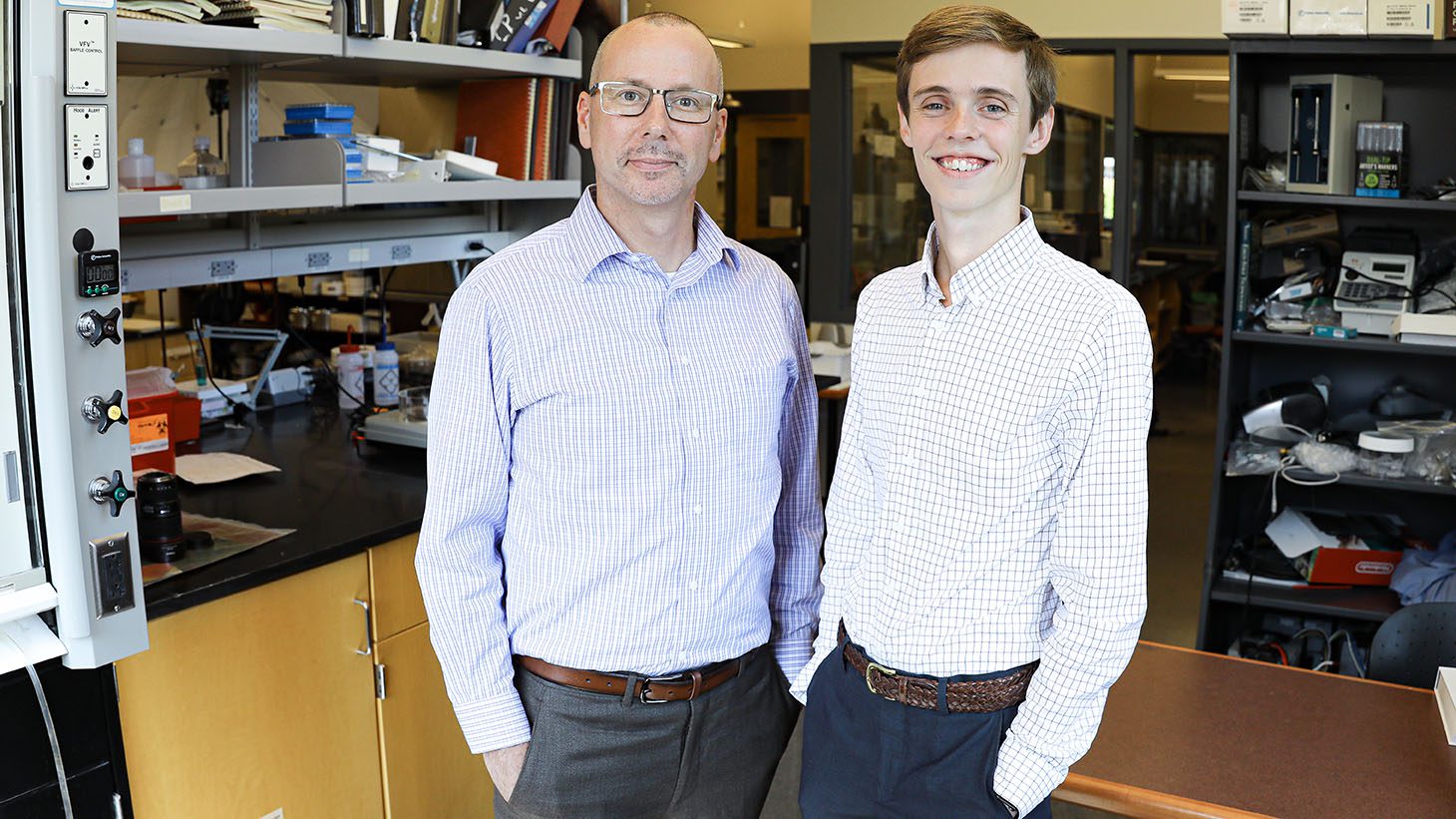Furman lands first SCRA grant ever awarded to a private institution

Furman Professor of Chemistry Greg Springsteen and Trent Stubbs ’20 have received a $25,000 Academic Startup Assistance Program early-stage funding grant from the South Carolina Research Authority (SCRA) for Aconobolics LLC, marking the first time the SCRA has ever awarded a grant to a private school.
The Academic Startup Assistance Program (ASAP) is available to for-profit companies sponsored by an academic institution. Springsteen and Stubbs c0-founded Aconabolics in 2018 after discovering a revolutionary route to produce molecules critical to metabolic flux analysis, an emerging technology able to diagnose cancer and bacterial infections more rapidly than traditional methods.
“This is huge, because it shows a vote of confidence by SCRA not only in this venture and what its potential is but also in the work that we’ve been doing through Furman Innovation and Entrepreneurship,” Anthony Herrera, executive director of Furman Innovation and Entrepreneurship, said.
Metabolic flux analysis relies on Carbon 13 (13C), an isotope of the element carbon, to create labeled molecules that help track the growth, metabolism and movement of cells, but existing methods for generating many of these compounds rely on expensive and inefficient biological pathways. The technique developed by Springsteen and Stubbs, however, can accomplish the same transformations synthetically at a much lower cost and with greater purity.
Increased access to these molecules could have a significant impact on medical care and research. SCRA Investment Manager Steve Johnson ’73 was on the panel that awarded the grant, and he said that Springsteen and Stubbs won the money based on the quality of their presentation coupled with the tremendous potential of their idea.
“We are voting on the technology. We are voting on the credibility they have, their market, how innovative they are,” Johnson said. “Faster, cheaper, better – that’s what we’re always looking for, especially in healthcare. The future of healthcare is going to be better outcomes at a lower cost, and this fits directly into that.”
Aconabolics is based on the Furman campus in a specially constructed lab in Plyler Hall. The $25,000 is earmarked for technology development and automation and serves as a foundation for the pursuit of follow-on funding if milestones are met toward commercialization.
Johnson, who also serves on the Advisory Board of the Department of Bioengineering at Clemson University, has known about Springsteen and Stubbs’ work since not long after its inception and has been involved with helping them bring Aconabolics to fruition. He has also worked closely with Furman Innovation and Entrepreneurship, serving as one of the judges at February’s Paladin Pitch Competition, which drew more than 500 people to McAlister Auditorium.
“The first company to come out of (Furman Innovation and Entrepreneurship) is Aconabolics, and for it come out of what has always been a historically strong chemistry department is not surprising,” Johnson said. “To give outright grants like we’ve done to Aconabolics, those are few and far between. So this really does stand out.”
The grant will help with automating the process to generate the molecules, which was a recommendation made by mentors at NEXT in Greenville to increase efficiency and compensate for the loss of Stubbs’ hands in the lab. Beginning in August, they’ll be occupied by the pursuit of a Ph.D. in chemistry at Emory University in Atlanta.
“We’re going to view ourselves as ‘now we’ve made it’ when we start selling these labeled compounds,” Springsteen said. “We’re still months away, but we’re getting close.”
NEXT is group of 134 businesses that work together to support entrepreneurship in Greenville, and helping Aconabolics gain admission to its mentee program is just one of the ways Furman Innovation and Entrepreneurship has supported the startup.
The most recent was working with Springsteen and Stubbs to perfect their pitch to SCRA, delivered over spring break in Columbia. They repeatedly practiced to an audience of Herrera and Derek Pederson, Furman’s entrepreneur in residence, and Adjunct Professor of Accounting and First Gentleman Charles Davis worked closely with them to create graphics for their slides.
“It took quite a bit of effort to get this together,” Springsteen said. “They helped us a ton with things like a pro forma, which is an overview of what the finances of the company will look like over the first couple of years.”
The SCRA is a public, non-profit corporation chartered in 1983 to support South Carolina’s innovation economy. Furman joins the Clemson University, College of Charleston, the Medical University of South Carolina and the University of South Carolina as recipients of ASAP grants.
Springsteen and Stubbs filed two provisional patents for their chemical process in 2019 and submitted the full patent for both U.S. and international rights in January. When the full patents are granted they will be only the second and third ever owned by Furman.